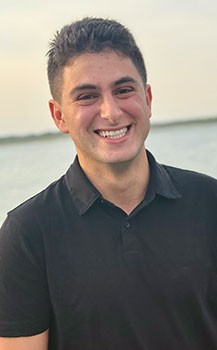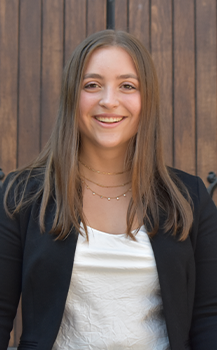The University of Chicago is home to hundreds of the world’s most advanced laboratories and research facilities. The Inside the Lab series gives audiences a first-hand look at the University’s research laboratories and the scholars who are tackling some of the world’s most complex problems.
This includes the Amanchukwu Lab at the University of Chicago Pritzker School of Molecular Engineering. There, the team researches ways to create large-scale inexpensive, safe batteries that will help us move toward a renewable future.
Two rising fourth-years majoring in molecular engineering on the chemical and soft materials engineering track—Luke Philips and Francesca Gossett (who is also minoring in sustainable energy and water resources engineering)—both work in the lab. Learn more about the work the lab is doing here and their personal experiences below.
Why did the work of the lab interest you?

Philips: The lab takes a two-pronged approach to the future of energy science—solving problems with storage and also solving problems related to production. When we talk about climate change, when we produce energy it results in a ton of CO2 being sent off into the atmosphere. Why not try to make something useful out of that? And on the flip side, if we can store energy more effectively and in a more environmentally friendly way, we'll also reduce the actual energy we need to produce because we’ll have less waste. We're tackling all angles of the problem, and we're doing so in a way that hopes to be economical. You say, “Okay, we know in theory what could be the best battery, or how to transform CO2. But how can we make it a reality?”
Gossett: I have always been passionate about sustainability, and over the years I've realized that the way to make the most impact is to do something in the renewable energy sector. In the Amanchukwu group, the focus on renewable energy and general environmentalism is deeply impactful. Batteries are not only a super cool technology that I think is vital for the future, but the chemistry behind them is fascinating. I have been working on an electrochemical project that is not directly battery focused but being able to focus on electrochemistry—using electrical current to make reactions run—has been really interesting to me. The work I do in the lab right now is focused on sustainability and human health while having impacts on the future of battery technology. I’m lucky to have found a project at a perfect intersection of my interests.
Tell me a bit about your work in the lab.

Gossett: I'm working on the electrochemical degradation of PFAS (perfluoroalkyl substances) molecules. PFAS are forever chemicals—when you hear about the plastics in your water, it’s usually this stuff. While you may not expect this to be the focus of a battery tech lab, PFAS are actually used in lithium-ion batteries. If we are going to be creating things with PFAS, such as new batteries for a renewable energy transition, we better know how to get rid of them. Day-to-day, I’m working with my mentor, Bidushi Sarkar, to run experiments to see if and how we can break down these molecules using different solvents and different electrical currents. I've been doing this for a little over a year now, and we've had some really good results, finding systems that are truly degrading the PFAS molecules.
Philips: I'm in the solid subgroup, focused on molten salt electrolytes. We know a lot of the components in a battery are very, very flammable. Instead of taking the salts and dissolving in solvents, which is typically one of the flammable parts of the battery, we’re working to take these salts and melt them down. This way, it keeps the conductivity and is less flammable. However, the salts melt at very high temperatures. So I'm working on making different mixtures of various kinds of salt in order to lower the melting point.
How has being involved in research shaped your experience in the College?
Philips: Finding community—with other undergraduates, with graduate students—has been really important. In addition to meetings where we’re talking about our work in the lab, also having someone to ask questions about an engineering concept has been great. I think that's really what the College is all about, learning through each other and all the fellow students. That extends beyond our professors and TAs. When I talk to Francesca, or talk to some of the other undergrads in the group, I learn so much from what they're doing.
Gossett: Getting myself into the lab during my second year was very impactful, not only to feel like part of the community that I continue to grow in, but I am also doing something that actually matters to me. It’s one thing to just be in a lab and just be a lab tech, and it's another thing to really care about the work you're doing and really be excited about the impact you potentially have on the world. I am proud of the work I’m doing and that has made my experience in the College much more meaningful.
Philips: I’ve found that research can be really rewarding and extremely frustrating, and I've experienced both sides of it. There are times when nothing's working, or you're missing a part of an experiment you need, or you've prepared everything and just one thing is not going your way. It kind of knocks you off your game, but it prepares you for the real world. You know, life is frustrating, the same way research is. However, those times when it’s good makes all those tough times worth it. Working in the lab has helped me become more resilient, and it's also made me more excited when the things actually do go my way and I get a cool result.